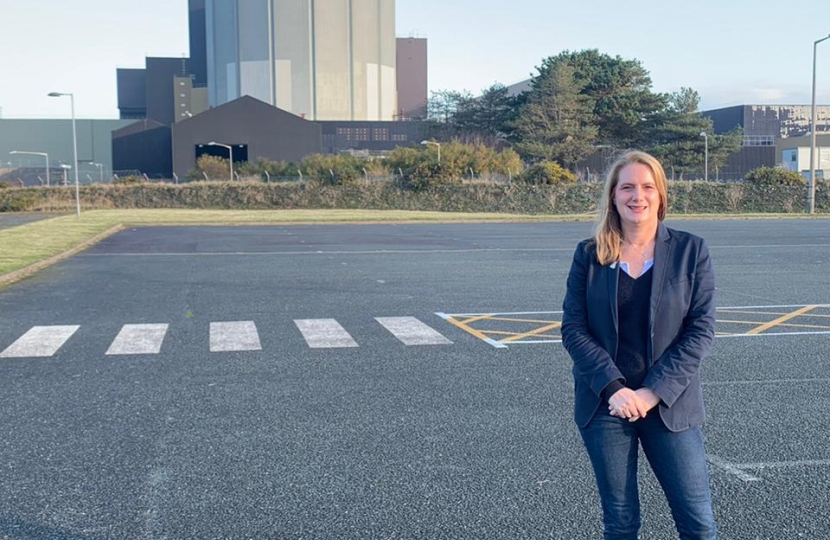
Russia’s invasion of Ukraine has caused an unparalleled period of energy price volatility. Energy security is now a significant domestic and global priority. Russia’s position as Europe’s fossil fuel giant gave Putin the brazen confidence to invade Europe, thinking the West would not respond for fear of high energy prices.
I am proud that the UK Government has stood up to Putin, supplying weapons and resources to Ukraine, whilst urging our NATO allies to keep up their support. But there’s no denying that this comes at a cost. Even though we rely very little on Russia for our oil and gas directly, we cannot shield ourselves from the volatility of the fossil fuel markets which Russian companies are major stakeholders in, and we rely upon.
The fact is that we cannot hope to ever influence the price of oil and gas, which are traded internationally. It is simply impossible for the UK to fill the gap left in the European gas market, which we rely upon. The North Sea is a mature basin and we export most of the gas we extract from it. The economic viability of exploiting our shale gas reserves at all is far from certain, but even if it were economic, it would not shift the dial in terms of the wholesale cost of gas, just as North Sea gas has not.
We are currently reliant upon gas for most of our heating, but also for power production. We can shield households from the volatility of gas prices by bringing more non-fossil fuel power production capacity online. This is the core idea behind the British Energy Security Strategy: secure our gas supplies as much as possible, but whilst seeking to reduce our reliance on gas as soon as we can to lower energy costs.
This is where nuclear power comes in. The security strategy declared an end to the lethargy in British nuclear that began with Tony Blair but regrettably continued throughout the 2010s. This comes alongside a raft of other measures from this government, such as the Nuclear Energy (Financing) Act, the launch of the Future Nuclear Enabling Fund, Future Fuels Fund, and the confirmation of High Temperature Gas Reactors (HTGRs) as the technology of choice for advanced nuclear demonstration.
More nuclear means less expensive gas is needed to keep the lights on. Alongside renewables, which have seen a dramatic drop in price over the last ten years, it will also help the government achieve its target of a carbon-free power system by 2035 and a net zero carbon emissions economy by 2050. Home-grown clean energy – nuclear and renewables – are now the key to hitting all three priorities of good energy policy: security of supply, affordability, and sustainability.
But there’s a fourth bonus of the British nuclear renaissance: economic growth. The North West Nuclear Arc – of which my constituency (Ynys Môn) is a part – plays host to much of the supply chain which will benefit from the eight new nuclear power stations the government is seeking to build. Each worker in the nuclear sector contributes an average of £96,000 gross value added to the economy and has a median salary of approximately £45,000. Betting big on the high-skill, high-paying industry spanning the North West of England and North Wales is surely what levelling up is all about.
However, while the nuclear industry has enjoyed enthusiastic backing right from the top in No. 10 Downing Street, there is still work to be done to leverage as much private investment into the industry as possible.
The Treasury is currently developing its ‘green taxonomy’, which clarifies for investors what is ‘green’ and what isn’t. The rationale for the taxonomy is to leverage as much private finance as possible into the net zero transition, as soon as possible. Despite being a zero carbon form of power production, there is apparently a danger that nuclear power might be left out of the ‘green’ list.
This would not disallow investment in nuclear, of course. But investors are looking for ‘green’ investments to meet their sustainability targets and because they know that, when 90 per cent of the global economy is already covered by net zero targets, ‘green’ means ‘growth’. Not having nuclear in the green list would simply mean a missed opportunity to get as much private investment into this vital sector as possible. That would potentially mean a greater role for taxpayer money instead, given the energy security imperative.
What’s more, if not putting it on the green list pushes up the cost of capital by even a percentage point through uncertainty, this could add a massive, unnecessary cost to building our new power stations – reaching into the hundreds of millions of pounds.
The transition to clean energy is necessary, given continuing our reliance on fossil fuels would mean an insecure, unaffordable, and unsustainable energy system. Nuclear power – especially advanced and small modular reactors – have a key role to play in that transition, providing the baseload that coal and gas once did and backing up renewables. Giving nuclear the final green light in the Treasury’s taxonomy is a must.




